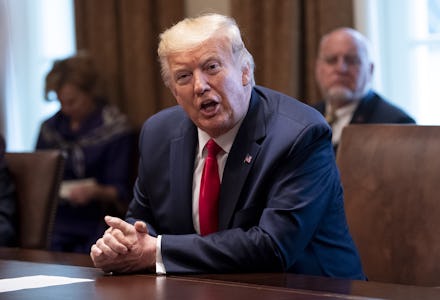Trump invokes a 1950 wartime law to fight coronavirus, the "invisible enemy"

As hospitals around the country prepare for an influx in cases that could overwhelm their limited number of beds and equipment, President Trump has invoked a law from 1950 to juice the government’s response to coronavirus. Called the Defense Production Act, the measure allows for the federal government to demand that American companies use their industrial capacity to produce crucial equipment that’s needed for the medical emergency, including ventilators, respirators, and other crucial health care gear. At a press briefing Wednesday, Trump said he was invoking the law “just in case we need it.”
The Defense Production Act dates back to the Korean War, when it was invoked to help the military create supplies for the conflict. According to the Federal Emergency Management Agency, the act offers "the primary source of presidential authorities to expedite and expand the supply of resources from the U.S. industrial base to support military, energy, space, and homeland security programs."
The act will provide Trump with "a broad set of authorities to influence domestic industry in the interest of national defense," said a Congressional Research Service report on the law from earlier this month, per CNN.
"The authorities can be used across the federal government to shape the domestic industrial base so that, when called upon, it is capable of providing essential materials and goods needed for the national defense," the report added.
The New York Times says that it obtained a government plan for dealing with the virus, which warned that the lack of supplies could end up “impacting health care, emergency services, and other elements of critical infrastructure” as hospitals face massive shortages. Trump has begun referring to coronavirus as "an invisible enemy."
Many in Congress have been urging the president to invoke the special powers for weeks, warning that time was slipping away as the virus advanced. Last Friday, a group of 57 members of the House sent a letter to Trump demanding that he invoke the act. “During World War II, our country adapted to the demands of the time to produce mass quantities of bombers, tanks, and many smaller items needed to save democracy and freedom in the world,” they wrote. “We know what the demands of this time are, and we must act now to meet these demands.”
This isn’t the first time that the act has been invoked since its 1950 inception, when President Harry S. Truman used it to mobilize infrastructure to manufacture supplies for the Korean War. In the ‘80s, under pressure from the Cold War, the Department of Defense began using the law to create technology that would become essential for the growing economy, encouraging the manufacture of semiconductors, microwave power tubes, silicon carbide ceramics, and more high-tech industrial components. More recently, President Barack Obama used the law in 2011 to compel technology companies to provide confidential information about their equipment as his Commerce Department investigated possible Chinese cybercrimes.
This is, however, the first time that the law has been used to create health equipment. It may have been implemented late in the game, but the law may provide a big boost to the overall ambitious goal for America: keeping people alive and healthy.